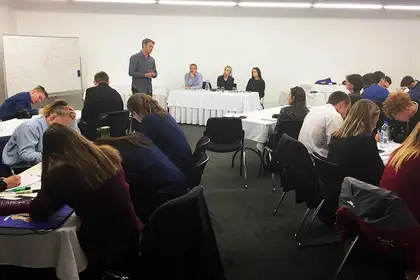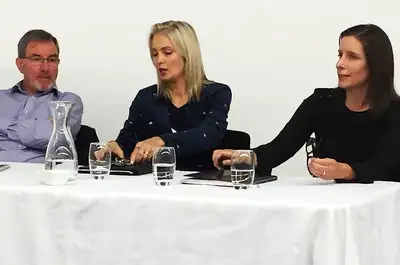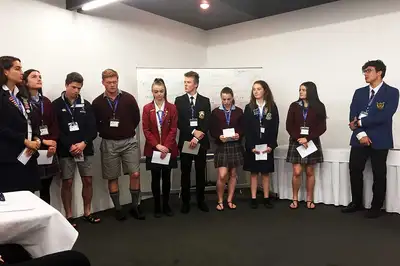
Professor Richard Shaw encourages students to continue their conversations and to get involved in decision-making.
A New Plymouth secondary school student who applied for an internship at a local engineering company and was told ‘no girls allowed’ described her dismay at her experience of gender inequality during a youth forum organised by Massey University.
Mental health, gender inequality, the living wage, poverty, the cost of tertiary education, and protecting the environment were among topics debated by senior secondary school students at a Young Leaders Symposium in New Plymouth last week, organised by the College of Humanities and Social Sciences.
The 35 participants at the Shout It Out: Young People Find Their Voice event were split into mixed school groups and asked to define the biggest social or political challenges facing young people today. They then had to come up with potential solutions. They were also asked to think about how the responsibility for implementing their ideas should be shared between young people and existing political decision-makers,.
Many spoke passionately about a wide range of issues in presenting their views and solutions to a panel, which included Pro Vice-Chancellor for the College, Distinguished Professor Paul Spoonley, as well as local councillor Stacey Hitchcock and chair of the Taranaki Chamber of Commerce Sophie Braggins.
One group said they would like to see legislation to change gender pay inequities in affected sectors, and felt education as well as a petition, protests, and a social media campaign could bring this about.

Panellists at the symposium - Distinguished Professor Paul Spoonley, Sophie Braggins and Stacey Hitchcock.
Ease up on the pressure
Another group raised the issue of pressures and unrealistic expectations on the young to succeed and fit in – socially, at school and at home – which can lead to anxiety, depression, self-harm and suicide.
They felt more awareness of the impact of pressure on youth is needed, and that school counsellors could play a greater role in supporting students who struggle with these issues. Schools need to better promote counsellors’ services and “take the counsellors to the students, rather than the opposite”, they said.
The idea of a Kiwisaver fund specifically set up to help students pay for education was the brainchild of a group concerned about how students can afford to study and pay for living costs, while another wanted to see the living wage adopted more widely.
Each group received feedback from the panellists and, in some cases, offers to continue the conversations and pursue solutions through more youth representation on council.

Taranaki high school students share their views.
Get involved, re-define politics
Professor Spoonley reminded students that Taranaki is the New Zealand province with the highest percentage of people aged over 65. He said it was the interests and views of this age group that tended to dominate the province.. “The trick for a province like is how to get your voices heard.”
He challenged the students to take their passion to find or create networks and mechanisms to get their views and voices heard – through local councils and other organisations, and social media – and to get involved in decision-making. He was impressed by their passion and hoped they would become more involved in shaping a future of their choice.
“It would be great to get more people on council who represent younger age groups. Be politically engaged and why not re-define politics?”
Other panellists offered words of encouragement too. Sophie Braggins told the group that the nature of the work environment was changing fast, but technology, automation or AI (Artificial Intelligence) could never replace or take away their voice and the things that made them unique.
Stacey Hitchcock implored students: “Don't underestimate the power of lobbying,” saying that discussing their concerns in the forum was a political act. By speaking out, “you plant seeds in the minds of decision-makers and policy makers.”
When asked by host Professor Richard Shaw what they had learned from the experience, one young man said it was a revelation to him to know that “there are people in education who want to talk to us about stuff that really matters”.
The symposium was the final of this year’s three symposiums run by the College held in the Hawke’s Bay, Palmerston North and Taranaki.
Professor Spoonley said he was “really impressed by the understanding and engagement of the students. They spoke about the issues of importance to them with passion. New Zealand is in good hands if these are our future leaders. It is a pity that these youth voices are not heard more widely.”